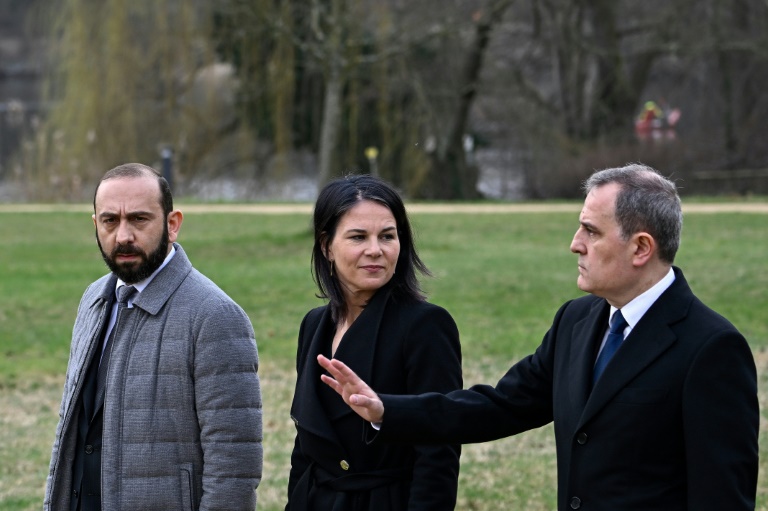Armenia, Azerbaijan make new push for peace in Berlin

The talks between Armenia and Azerbaijan’s foreign ministers come after a direct meeting between the two countries’ leaders in Munich
Berlin – Germany on Wednesday hailed the “courageous steps” taken by Armenia and Azerbaijan as the Caucasus neighbours began peace talks in Berlin, in a new push to resolve a decades-long conflict.
The dialogue involving Armenia’s Ararat Mirzoyan and Azerbaijan’s Jeyhun Bayramov builds on a surprise direct meeting between the two nations’ leaders on the sidelines of the Munich Security Conference earlier this month.
“What we’re seeing now are courageous steps by both countries to put the past behind and to work towards a durable peace for their people,” said host of the talks, German Foreign Minister Annalena Baerbock.
“We want you to be able to walk the path to durable peace,” she told the two ministers as she opened the two-day meeting after the trio took a short stroll on the lush grounds of Villa Borsig, a foreign ministry retreat.
Under German Chancellor Olaf Scholz’s mediation, Armenian Prime Minister Nikol Pashinyan and Azerbaijani President Ilham Aliyev agreed in Munich to push on with peace negotiations.
The leaders also pledged to resolve differences “exclusively through peaceful means and without the use of force,” Scholz’s spokesman said.
The Munich meeting marked a sharp easing of tensions after a new spate of volatility along the border when both sides accused each other of opening fire. Armenia said the skirmish left four of its soldiers dead.
Armenia and Azerbaijan fought two wars, in the 1990s and in 2020, before Azerbaijani forces last September retook control of the breakaway region of Nagorno-Karabakh in a lightning offensive that ended three decades of Armenian separatist rule over the enclave.
Tensions have remained high since Baku re-captured Nagorno-Karabakh in an operation that triggered the exodus to Armenia of most of the enclave’s entire ethnic-Armenian population of more than 100,000 people.
– ‘Full-scale war?’ –
Yerevan is concerned that Azerbaijan, emboldened by its success in Karabakh, could invade Armenian territory in order to create a land bridge to its Nakhchivan enclave.
Aliyev, who won re-election this month, said in an inauguration speech it was Armenia, not Azerbaijan, that had outstanding territorial claims.
And Pashinyan warned after a deadly clash along the two countries’ border earlier in February that Azerbaijan was preparing for a “full-scale war” with its historic foe.
Baerbock had travelled to both countries in November to urge the arch-foes to revive dialogue.
Pashinyan and Aliyev previously said a peace agreement could have been signed by the end of last year, but internationally mediated peace talks have failed to yield a breakthrough.
Until Aliyev refused to attend a round of peace talks in Spain in October, the European Union and United States had played a lead role in mediating Azerbaijani-Armenian normalisation talks.
The traditional regional power broker Russia — bogged down in its Ukraine war — has seen its influence waning in the Caucasus.
